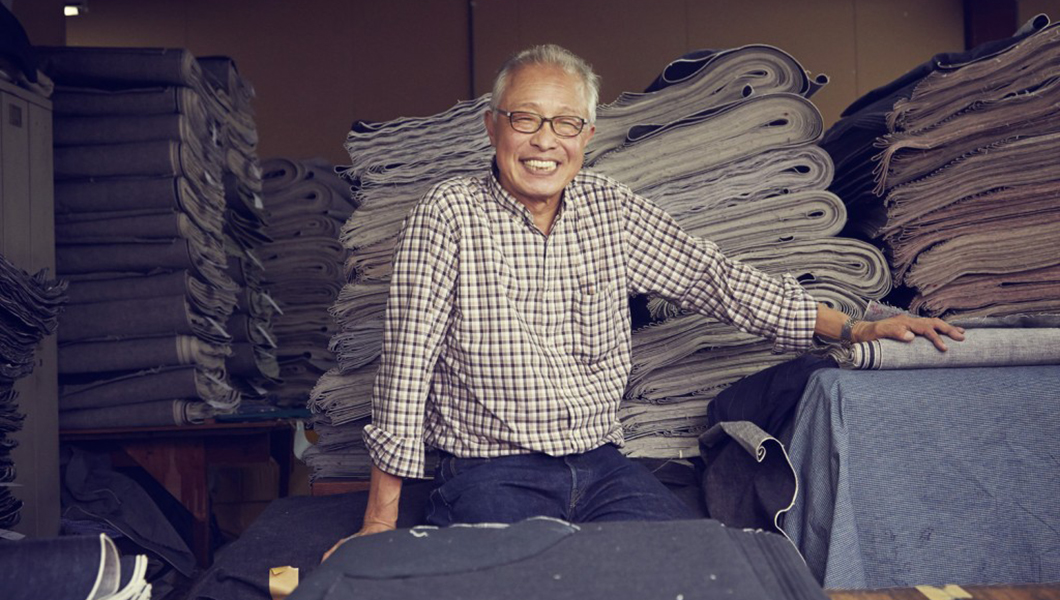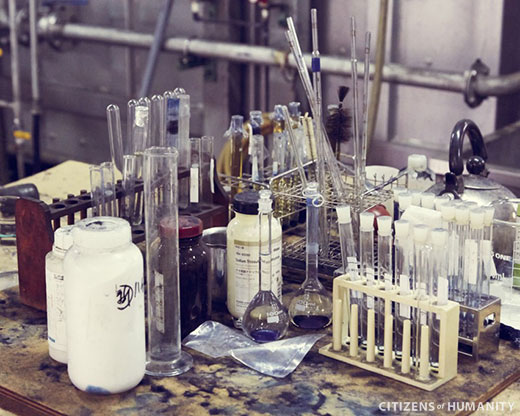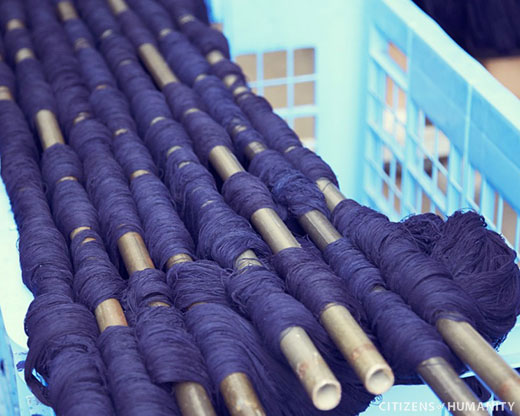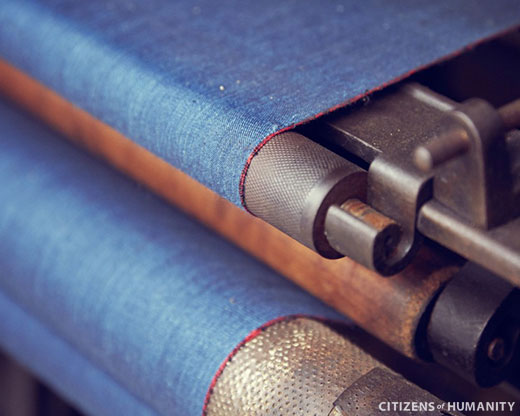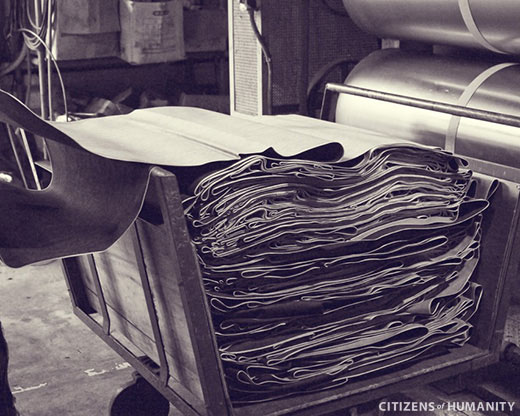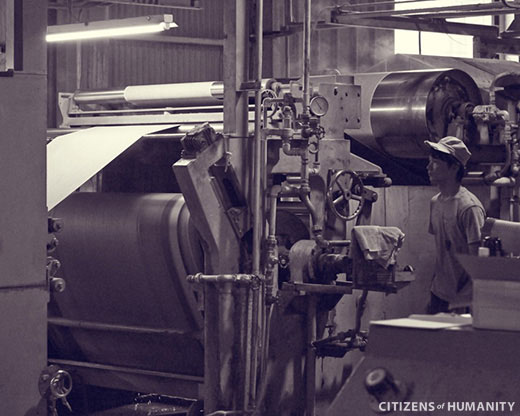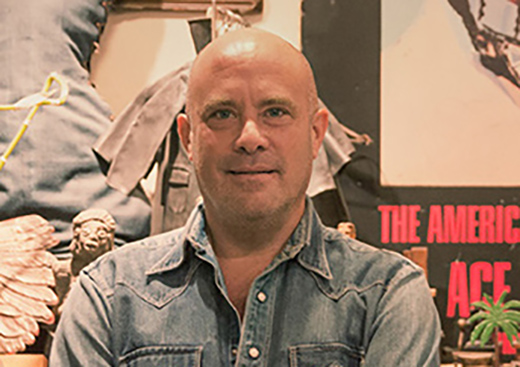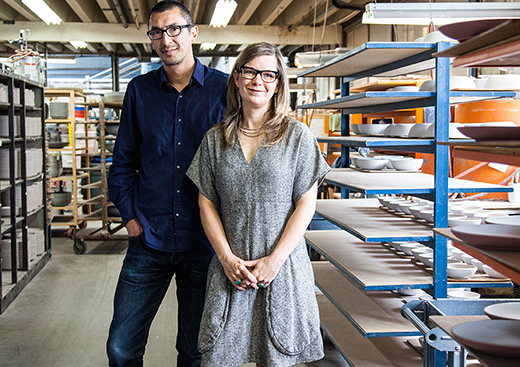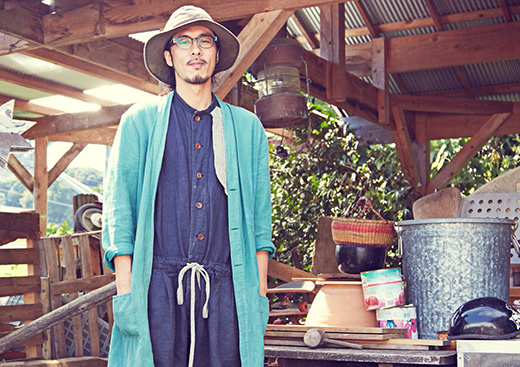Nestled in the mountains of Okayama Prefecture, a few hundred miles west of Tokyo, sits the unassuming Nihon Menpu denim mill. There, president Shinji Kawai heads up a business that’s been in his family since 1917, crafting premium selvage denim on 1920s-era looms and then dip-dyeing it in vats of natural indigo. The process is time consuming and old fashioned, but Kawai, with his reverence for tradition and quality, wouldn’t have it any other way.
Kawai’s been working at Nihon Menpu (which translates to “cotton cloth-maker in Japan”) since graduating from college 41 years ago; his ancestors started the business, so it was a foregone conclusion that he’d end up at the company. “It was a matter of course,” he says. “When I was little, I’d visit the factory, so learning how to work with the fabric was a natural evolution.” But over the past few decades, he’s seen the denim industry change tremendously. “The number of makers has rapidly declined,” he says. “In Okayama, there used to be cotton machines centered on denim, and synthetic-fiber machines related to polyester. But the synthetic-fiber machines have all been abandoned.”
Nihon Menpu produces fabric that’s revered by denim freaks the world over, and its methodologies are still kept secret, so competitors won’t copy them. But Kawai says his factory differs from that of other textile manufacturers because it has a hand in every stage of the denim. “We bring in the thread and turn it to cloth with dyeing, manufacturing, and finishing, then we link everything up to shipping,” says Kawai. “We can create many types of raw material: cotton, wool, flax, polyester, rayon. Dye-wise, we also have exceptional knowledge of indigo and deep blue.”
Why did denim take hold so aggressively in Japan in the first place? “I think the surge of interest in denim here happened around 1990,” Kawai recalls. “I guess it was because the blue color of denim was thought to resemble America, and young people in Japan took that in.” Now, Japan is a mecca for denim collectors, and is renowned for its jean-centric vintage stores. “We’ve studied old Levi’s jeans, old Lees and old Wranglers,” says Kawai, “and we’ve reached the point where we can analyze data like the shape of irregularities in the thread, the depth of the indigo color, and the shape of the selvage and number of threads. As a result, we’re able to produce various indigo colors that express subtle mixed emotions.” And Kawai notes that denim has a unique property that sets it apart from nearly all other fabrics. “Normally when buying clothing, a suit for example, it’s at its best at the time it’s purchased,” he explains. “But with denim pants dyed with indigo, it’s best six months or a year after purchase. That’s about the time the color fades, and it becomes just right.”
Speaking of fading denim, Kawai is as much a fan of vintage as the next jean connoisseur. He says he still gets a thrill from “analyzing secondhand garments, and reusing cloth techniques that experts created many years ago.” But Kawai is aware that in order for Nihon Menpu to thrive, it needs to keep moving forward. “Our company does business with about 100 other companies, both inside and outside Japan,” he says. “We get information from those customers, and have discussions with designers and brands about their visions. We try to deepen our understanding of denim by talking about current worldwide trends.”
While his company may be forward thinking, Kawai’s a traditionalist when it comes to hard work. The best piece of advice he’s ever received? “I was once told, ‘A person who is most severe with himself does it for his own good.’” Still, he isn’t all business all the time. He says he values people with “affectionate hearts,” and that the most important life lesson he’s learned is, “to have an attitude of thanks toward those you’re close to at home and at work.”
Kawai loves to travel to New York (which he calls “the center of the world”) and spent his college years in Tokyo, but otherwise, he’s lived his entire life in Ibara, Nihon Menpu’s home. And he says there’s good reason the company couldn’t make its premium denim anywhere else. “Nihon Menpu aims to produce high-class products, and for that reason, it’s imperative to have various Japanese cultural and emotional influences,” says Kawai. “On the production side, we currently employ 60 people, and everyone takes their job very seriously. We can also obtain world-class raw cotton for making products; the spinning industry here is at a high level.”
For first-time visitors to Japan, Kawai recommends some must-see experiences: “You should definitely visit the temples in Tokyo, Kamakura, and Kyoto, and even experience Zen meditation,” he says. “After that, you should see the Jeans Street in Kojima, in Okayama Prefecture. In Tokyo, it would be sumo wrestling and kabuki theater.” They’re classic picks—after all, temples, Zen meditation, and kabuki have existed in Japan for hundreds of years. At the same time, the country’s always been at the forefront of technology. Asked about that dichotomy, Kawai says the past and future are actually more intertwined in Japan than most of us realize. “Japanese people basically have a serious and methodical temperament, so pushing technology and placing value on tradition are actually the same thing,” he says. “In general, I think the Japanese are good people—they don’t lie that much.”
—


